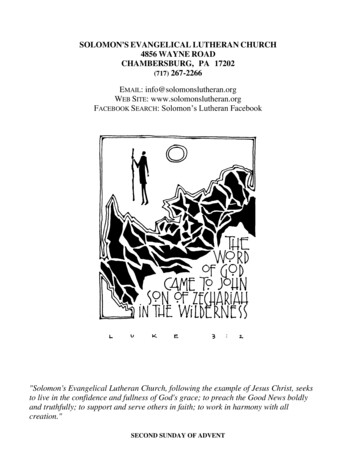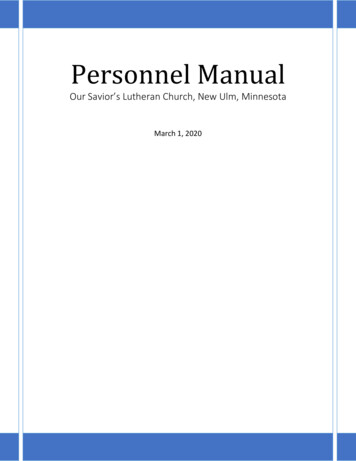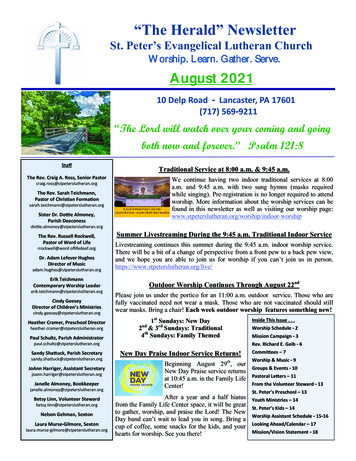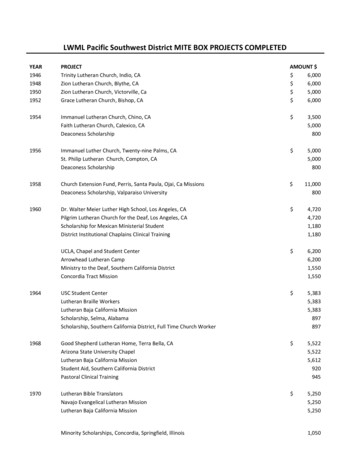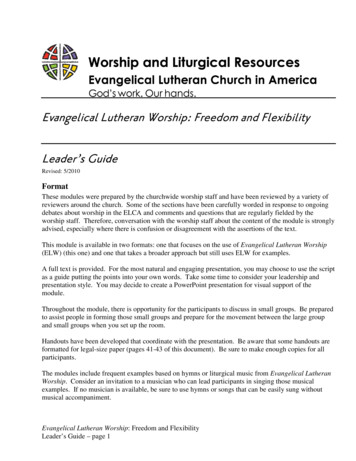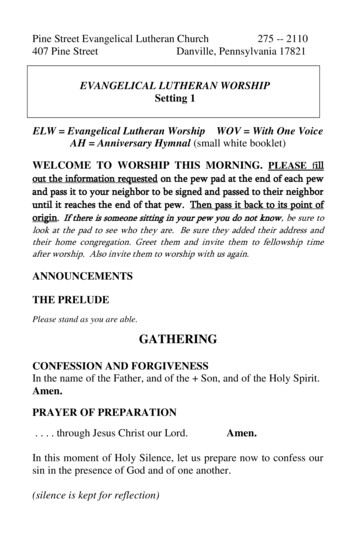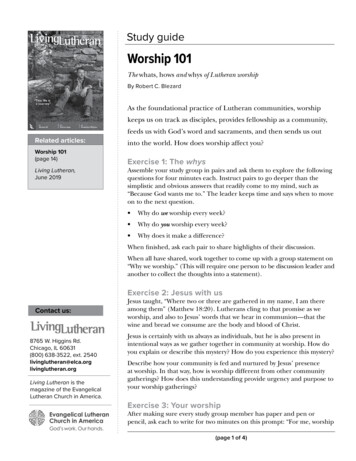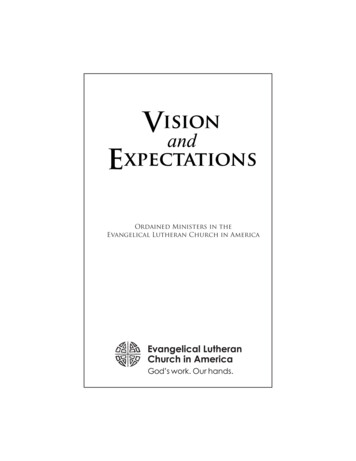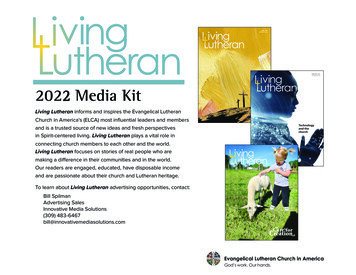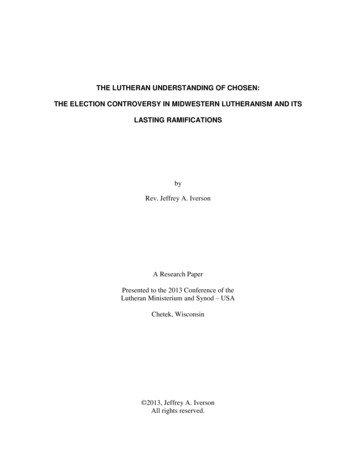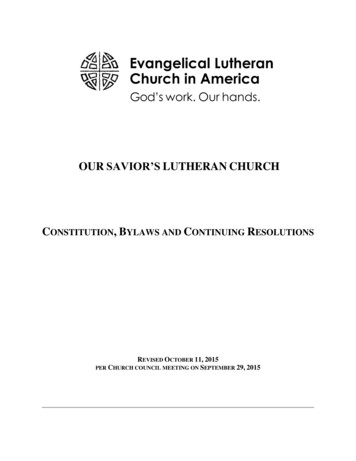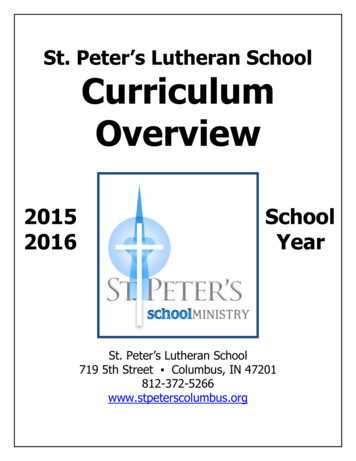
Transcription
St. Peter’s Lutheran SchoolCurriculumOverview20152016SchoolYearSt. Peter’s Lutheran School719 5th Street Columbus, IN 47201812-372-5266www.stpeterscolumbus.org
Table of ContentsGrading ocial StudiesSpanishHealthPhysical EducationArtMusicTechnologyPage 2Page 3Page 7Page 9Page 11Page 13Page 16Page 18Page 19Page 21Page 23Page 25Page 26St. Peter’s A Nationally Recognized EXEMPLARY School1 Page
Grading ScaleAs we begin our 152nd school year, it is important that all students and parents are fully aware of the grading scales used forthis school year, especially as they relate to specific classes. Please know that our grading scale mirrors our local high schoolgrading scales. Questions may be directed to classroom teachers or our school office. Thank you for being a part of the SPLSfamily!Primary Grading ScaleSecondary Grading ScaleA AAB BBC CCD DDFE: ExcellentS: SatisfactoryN: Needs ImprovementU: Unsatisfactory100 – 97.5%97.4 – 92.6%92.5 – 90.0%89.9 – 87.5%87.4 – 82.6%82.5 – 80.0%79.9 – 77.5%77.4 – 72.6%72.5 – 70.0%69.9 – 67.5%67.4 – 62.6%62.5 – 60.0%59.9% and Below[12][11][10][9][8][7][6][5][4][3][2][1][0]100 – 90%89.9 – 75%74.9 – 65%64.9% and BelowDiscipleshipAll students in grades 5-8 will receive a Discipleship grade based upon our Primary Grading Scale. Students in grades K-4 willreceive a Discipleship grade based upon our Secondary Grading Scale.Memory WorkK-1st grade students will receive a Memory Work grade based upon our Secondary Grading Scale. 2-8th grade students willreceive a Memory grade based upon our Primary Grading Scale. For GPA purposes for our 5-8th grade students, MemoryWork will count 20% of a full grade. For example, Math will receive a 100% grade weighting toward total GPA, while MemoryWork will only receive a 20% grade weighting toward total GPA.SpecialsK-4th grade students will receive Specials grades based upon our Secondary Grading Scale. 5-8th grade students will receiveSpecials grades based upon our Primary Grading Scale. For GPA purposes for our 5-8th grade students, Specials will count 20%of a full grade for each day that the Special meets per week. For example, if a student has Art two days per week, then Art isweighted at 40% of a full grade.Church AttendanceChurch Attendance is not a graded subject. We apologize for any confusion on this.St. Peter’s A Nationally Recognized EXEMPLARY School2 Page
DiscipleshipSchool-Wide Memory CurriculumGOD’S WORD ALIVE OverviewGod's Word Alive, based on God's Word and Luther's Small Catechism, is designed to empower students at St. Peter'sLutheran School to have God's Word on their hearts and minds and apply it to their everyday lives.Kindergarten Discipleship OverviewKindergarten students will develop a personal relationship with Jesus through weekly Bible stories, songs, crafts, andprayer.Grade 1 Discipleship OverviewStudents in first grade will strengthen their faith through time spent each day in devotion, prayer, song and exploringGod's Word. Our main focuses are on basic Bible stories, Catechism, and developing a servant attitude for others.Grade 2 Discipleship OverviewStudents in second grade will come to faith and grow each day through devotions, bible stories, memory verses, prayerand the Catechism. Students will be able to express their faith daily by exploring God's word and sharing it with othersaround them.Grade 3 Discipleship OverviewThroughout the third grade year, we will strengthen and grow in our faith by emphasizing the Scriptural truthscontained in Luther's Small Catechism. These truths include: the Ten Commandments, the Apostles' Creed (attributesof Father, Son, and Holy Spirit,) the Sacraments, the Lord's Prayer, the truth of God's of God's Word, Confession,Absolution, and spreading the Gospel to others. Time is spent each day in devotions, prayer, praising, and applyingBible stories to our daily lives.Grade 4 Discipleship OverviewThrough our study of the bible and catechism, children will learn how to spend time in God's word through dailyreading and journaling. Children will learn how to defend their faith and feel comfortable sharing God's word withothers. We will study various bible stories and focus on how to apply what we have learned from the bible to oureveryday life.Grade 5 Discipleship OverviewStudents in fifth grade will know the Triune God, come to and mature in their faith, and identify themselves as amember of the body of Christ. Students will demonstrate a life of joy, contentment, and and harmony with God,themselves, and others. They will express their faith of God in service and worship and understand the value of allGod's creation and care for it wisely. Fifth graders will be able to witness their faith in Jesus, their personal Savior andthe Savior of all people and live in the Christian hope of new and eternal life in Christ Jesus.St. Peter’s A Nationally Recognized EXEMPLARY School3 Page
Grade 6 Discipleship Overview:In 6th grade, we will spend each Friday dealing with Part of Luther’s Catechism in connection with our school’s memorywork. Each quarter we will tie God’s Word in the Modern day world and its issues. Mr. Sollenberger will cover conflictresolution in a LC-MS program called The Young Peacemaker. In his other quarter teaching, he will focus on JohnWooden’s Pyramid of Success. This involves the basic values Christians need to be all they can be in the world asChildren of God. We will add to this Tony Dungy’s work Uncommon and The Mentor Leader. Mrs. Franke will alsorelate God’s Word with issues students face on a daily basis. She will cover topics as how to face struggles in lifethrough Max Lucado’sFacing Your Giantsand Soul Surfer faith-faith based Bible materials. She will also tie in variousresources of how God’s Word is connected with our Science Curriculum.Grade 7 Discipleship OverviewCatechismIn Jr. High Catechism, students review the content in Luther’s Small Catechism as well discuss how each concept appliesand plays out in our current culture.James Bible StudyThroughout the course of one nine-week quarter, 7th grade students will be looking in-depth at the book of James. Eachchapter will be read and “broken-down” in an effort to look at what the book of James is really saying to Christiansliving in today’s world. One misconception that will be uncovered and explained is James’s ascertation that “faithwithout deeds is dead” some argue that this means you must work to receive salvation instead of it being God’s freegift to believers. We see this command as a challenge to faithful followers of Jesus Christ to not just “talk the talk,” butto “walk the walk.” Throughout the study of James, a foundation will be laid for next year’s “Christians In Action” (CIA)service project, a graduation requirement for all 8th grade SPLS students.CreationOne unit covers the Bible book of Genesis up to the birth Joseph. In this course the students will learn how God createda perfect Earth and everything in the Universe. They will study how man fell away from God and how God promisedthem a Savior from the beginning. Through the lives of people in Genesis students can learn how to live God pleasinglives, how to avoid some of the mistakes made by the people of old. Throughout Genesis students will see God's handin the lives and salvation of the believing individuals recorded and how God has a plan for their life.Grade 8 Discipleship OverviewCatechismIn Junior High Catechism, students review the content in Luther’s Small Catechism as well discuss how each conceptapplies and plays out in our current culture.Christians in Action (CIA) ProjectAll 8th grade students at St. Peter’s Lutheran School will work to develop and implement an in-depth service projectthat makes a worthwhile contribution to the community. Students must use their knowledge of God’s Word as well asacademic skills to address and take action on a community need. In addition to the planning and implementation of theproject, students will learn and practice a variety of skills including: letter writing, research skills, phone etiquette skillsand public speaking. Students will have both individual and group assignments to complete during the course of thefirst semester. Groups will create a physical project and present an oral presentation before a panel of judges for theirculminating project. Throughout the semester, students will review their past Bible study of the book of James as wellas other Biblical references for the idea of service.Psalms and ProverbsOne unit concentrated on the Biblical books of Proverbs and Psalms. They students will spend time reading over thetruth that God shares with us through the wise words of David, Solomon and other presented in Psalms and Proverbs.They also spend will time relating those truths to their life today and for their future references.ApologeticsSt. Peter’s A Nationally Recognized EXEMPLARY School4 Page
What is truth? Why do we believe what we believe? How do we know what we believe is true? These questions areones that we all wrestle with. All 8th grade students at St. Peter's Lutheran School will seek to answer these questionsand more while learning how to be prepared to give an answer to everyone who asks them to give the reason for thehope they have; and to do this with gentleness and respect. (1 Peter 3:15)St. Peter’s A Nationally Recognized EXEMPLARY School5 Page
MathematicsMATHEMATICS VISION STATEMENTWith a strong foundation of math facts and concepts, students will be prepared for high school and equipped tosuccessfully apply practical math skills.INSTRUCTIONAL CORE VALUES Ensure that the continual progression of math concepts will prepare students for next level of learningIntroduce and utilize grade-level appropriate math vocabulary termsIncorporate technology into learningFacilitate an active learning environmentAddress individual student’s math needs with available resourcesKindergarten Math OverviewStudents in Kindergarten will learn beginning math concepts that will ready them for First Grade. Students will focus onnumber recognition, counting, patterns, and basic math functions. Students receive many hands-on opportunities torefine these skills.Grade 1 Math OverviewStudents in first grade will grow in their basic math skills and knowledge. Our main focuses are on number sense,problem solving, addition and subtraction fluency. We also explore the concepts of money, time, geometry, graphs,place value, and measurement. Students will further their understanding of these concepts through guided instruction,manipulatives, and hands-on activities.Grade 2 Math OverviewGrade 2 students will review the skills they learned in first grade and build upon those skills in second grade. Those skillsinclude number and operations, algebra, geometry, measurement, and problem solving. Students will gain knowledge ofthese skills by using print materials, hands-on learning, digital resources and engaging fiction stories.Grade 3 Math OverviewGrade 3 students review basic addition, subtraction, geometry, and numeration skills. Students understand the conceptof multiplication and master multiplication facts. Students are introduced to the concept of division and begin learningdivision facts and the process of long division. Students are also introduced to fractions.Grade 4 Math OverviewIn grade 4, math will be taught so that students can see the benefits of learning math and be able to make mathconnections that can be utilized in daily life. Students will gain knowledge of these skills by video lessons, solvingalgorithms and word problems, drawing models and explaining strategies. Students will focus on a variety of skills toprepare them for 5th grade.St. Peter’s A Nationally Recognized EXEMPLARY School6 Page
Grade 5 Math OverviewStudents in Grade 5 will develop skills in classification, numeric representation, comparisons, and relationships in thebase – ten numeration system. These skills cover additional subtraction and division/multiplication computations ofwhole numbers. Appropriate grade level fraction and decimal problems are taught and assessment occurs on all levelsof the math curriculum. Each concept taught has life skills and practical application problems for increased studentunderstanding. Basic geometry and algebraic concepts are also introduced at this level. Customary and Metric units oftime, measurement, and capacity are integrated throughout the curriculum.Grade 6 Math OverviewThis course of Mathematics allows the 6th grade student to reinforce the basic computation skills while developinghigher level cognitive skills. The course lays the foundation for Pre-Algebra for the students.Grade 6 Advanced Math OverviewThe Advanced 6th grade Mathematics is designed to reach the needs of those 6th grade students who the drive oraptitude for more challenging work to prepare for Junior High Mathematics. This course is more rigorous and calls forhigher level cognitive skills in Preparation for Pre-Algebra or Algebra.Grade 7 Pre-Algebra OverviewThe 7th grade students, after taking the Pre-Algebra class, will have a firm understanding of the basic computationalskills. They will be able to convert simple word problems into Algebraic expression and solve them. At the end of 7thgrade the students will have the foundational skills to successfully complete an Algebra class as 8th graders.Grade 8 Algebra OverviewThe 8th grade Algebra class is designed to help students learn how to see patterns, how to generalize these patternsinto rules and how to make connections and solve problems. The students learn communication skill when explainingtheir reasoning to their fellow classmates. These skills are valuable tools in working in the real world.St. Peter’s A Nationally Recognized EXEMPLARY School7 Page
ReadingENGLIGH LANGUAGE ARTS VISION STATEMENTAligning with the Indiana Academic Standards, our school will provide all students with a strong foundation in languagearts which builds on itself to achieve mastery at each grade level.INSTRUCTIONAL CORE VALUES Instructional continuityConsistent expectationsCommon terminology and practicesEvident student-to-learning connectionsIndependent reading and writing preparednessResource OverviewThe Resource Department at St. Peters Lutheran School develops educational plans for the purpose of meeting theneeds of the exceptional students. We provide on-going assessment and evaluation using such programs as Dibles, Star,and Leveled Literacy Intervention Benchmark Assessment System, to ensure each student is working toward theirpersonal goals and objectives. We use a wide variety of programs such as Explode the Code, Great Leaps, LeveledLiteracy Intervention, Orton-Gillingham and other multi-sensory approaches to meet the needs of our resourcestudents. The Resource Department also coordinates with the classroom teacher to help each student move successfullythrough the classroom core curriculum content. We strive to help each student understand that they are a special andimportant child of God!Kindergarten Reading OverviewStudents in kindergarten will learn beginning reading skills such as letter and sound recognition, phonemic awareness,C-V-C words, and word families. Beginning reading skills are introduced and students are given the opportunities topractice these skills through small reading groups, word family activities, and manipulatives.Grade 1 Reading OverviewStudents in first grade will spend a substantial amount of time each day in developing their English/Language Art skills.Students will build on skills learned in Kindergarten by blending letter sounds to form words, including vowels,consonant blends, digraphs, and vowel patterns. Word endings and word families will also be emphasized. Students willdevelop fluency and build comprehension skills through guided instruction, independent reading time, and small groupactivities. Students will experience a variety of genres and use leveled text according to individual reading ability.Writing is integrated daily with our Language Arts time focusing on capitalization, punctuation, and writing completethoughts.St. Peter’s A Nationally Recognized EXEMPLARY School8 Page
Grade 2 Reading OverviewGrade 2 students will develop the ability to comprehend texts of varied genres with increasing complexity. The focus ofthe genres is mainly fiction and informational text. Students will learn to support their ideas using text evidence fromthe reading and will be able to apply this to their oral and written assignments Daily phonics, vocabulary, spelling andgrammar lessons will be presented through daily instruction and students will be able to use these skills in all areas oflanguage arts.Grade 3 Reading OverviewGrade 3 students discover many reading genres, mainly focusing on fictional and informational texts. Students learnhow to read for meaning, and also how to use the text to prove their answers and opinions. Students learn that textevidence is crucial to their oral and written responses to text. Students' vocabulary continues to grow through theirreading, allowing them to be challenged in their reading text choices. Students' spelling continues to improve as they'rebecoming more aware of frequently used words and also new words in the texts they're reading.Grade 4 Reading OverviewIn grade 4, language arts will be taught so that students can see the importance of reading. Students will makeconnections to our reading selections by discussions, journaling and various projects completed throughout the schoolyear. We will focus on theme, point of view, story structure, plot, character, and setting of our stories. Through theseactivities, students will be prepared for 5th grade.Grade 5 Reading OverviewGrade 5 students read many reading genres, focusing on fictional and informational texts. Students read for meaning,using text evidence to support and prove answers and opinions. Students continue to make connections to the readingtexts through discussions and writing. Students' vocabulary continues to grow through their reading, allowing them tobe challenged in their reading text choices. Students begin to develop higher level cognitive skills, which will be neededin sixth grade and beyond.Grade 6 Reading OverviewThis course of Reading allows the 6th grade student to reinforce the basic reading skills while developing higher levelcognitive skills. Emphasis will also be placed on vocabulary within the reading curriculum. The course lays the foundationfor the challenges and expectation set forth in their 7th and 8th grade years.Grade 7 Reading OverviewIn this course of study, students read a wide range of fiction, nonfiction, classic, and contemporary works, to build anunderstanding of texts, of themselves, and of the cultures of the United States and the world; to acquire newinformation; to respond to the needs and demands of society and the workplace. Students apply a wide range ofstrategies to comprehend, interpret, evaluate, and appreciate texts. They read a wide range of literature in many genresfrom a variety of time periods and cultures from around the world to build an understanding of the many dimensions ofhuman experience. They draw on their prior experience, their interactions with other readers and writers, and readingskills that they have developed and refined. In Reading 7, there are three key areas: Key Ideas and Textual Support,Structural Elements and Organization, and Synthesis and Connection of Ideas. By demonstrating the skills listed in eachsection, and reading a variety of literature within a range of complexity, students should be able to meet the LearningOutcome for Reading 7 and interact with texts proficiently and independently at the middle of the range and withscaffolding as needed for texts at the high end of the range.St. Peter’s A Nationally Recognized EXEMPLARY School9 Page
Grade 8 Reading OverviewIn this unit of study, students read a wide range of fiction, nonfiction, classic, and contemporary works, to build anunderstanding of texts, of themselves, and of the cultures of the United States and the world; to acquire newinformation; to respond to the needs and demands of society and the workplace. Students apply a wide range ofstrategies to comprehend, interpret, evaluate, and appreciate texts. They read a wide range of literature in many genresfrom a variety of time periods and cultures from around the world to build an understanding of the many dimensions ofhuman experience. They draw on their prior experience, their interactions with other readers and writers, and readingskills that they have developed and refined. Three key areas found in Reading 8: Key Ideas and Textual Support,Structural Elements and Organization, and Synthesis and Connection of Ideas. By demonstrating the skills listed in eachsection, and reading a variety of literature within a range of complexity, students should be able to meet the learningoutcomes, as well as interact with texts proficiently and independently.St. Peter’s A Nationally Recognized EXEMPLARY School10 P a g e
WritingENGLIGH LANGUAGE ARTS VISION STATEMENTAligning with the Indiana Academic Standards, our school will provide all students with a strong foundation in languagearts which builds on itself to achieve mastery at each grade level.INSTRUCTIONAL CORE VALUES Instructional continuityConsistent expectationsCommon terminology and practicesEvident student-to-learning connectionsIndependent reading and writing preparednessKindergarten Writing & Language OverviewStudents in Kindergarten will learn basic sentence structure and punctuation skills. Students will practice these skillsthrough journaling, along with narrative, informative, and opinion writing genres. Beginning language and grammarrules are introduced and students are given the opportunities to practice these skills through dictation and in theirwriting and speaking.Grade 1 Writing & Language OverviewWriting is integrated daily with our Language Arts time focusing on capitalization, punctuation, and writing completethoughts. We also explore writing for different purposes and audiences, focusing on narrative and informative pieces.Beginning editing skills are also introduced.Grade 2 Writing & Language OverviewStudents in Grade 2 will demonstrate increasing sophistication in all aspects of language use, from vocabulary andsyntax to the development and organization of ideas. Student will write opinion, informative, and narrative pieces.Students writing will be focused and contain details. Their writing will be strengthened by revising and editing. Basiclanguage and grammar rules are taught and students are given opportunity to transfer these basics into their writingand speaking.Grade 3 Writing & Language OverviewStudents in grade 3 review basic writing and punctuation skills, while learning new and advanced concepts to bettertheir writing. Focusing on narrative, informative, and opinion writing genres, third grade students receive a variety ofopportunities to use their learned skills while writing complete and well formed paragraphs. Basic language andgrammar rules are taught and students are given opportunity to transfer these basics into their writing and speaking.St. Peter’s A Nationally Recognized EXEMPLARY School11 P a g e
Grade 4 Writing & Language OverviewStudents in grade 4 will review basic writing and punctuation skills while learning new concepts to better their writing.We will focus on narrative, informative, and opinion writing genres. Various projects will be incorporated for students todisplay their knowledge and skills such as poetry books, essays, class newspaper, and well formed paragraphs. Anoverview of language and grammar rules will be taught throughout the year and applied to their writing and speaking.Grade 5 Writing & Language OverviewStudents in grade 5 review basic writing and punctuation skills, while learning new and advanced concepts to bettertheir writing. Students receive a variety of opportunities to use their learned skills while writing stories, reports, andessays in the narrative, informative, and opinion writing genres. Basic language rules are taught, and students are givenopportunities to transfer these basics into their writing and speaking. Technology is utilized to produce and publishstudent writing.Grade 6 Writing & Language OverviewThis course of Writing/English allows the 6th grade student to reinforce the basic skills while developing higher levelcognitive skills. The course lays the foundation for advancing their essay and narrative writing skills as well as laying thefoundation for advance writing at higher skill levels.Grade 7 Writing & Language OverviewStudents will employ a wide range of strategies as they write and use various writing process elements to communicatewith different audiences for a variety of purposes. Students will apply knowledge of language structure & conventions,media techniques, figurative language, and genre to create, critique, discuss, and share writing. Students research bothissues and interests by formulating ideas and questions. They analyze data from various sources to communicate theirdiscoveries for the purpose of teaching and meeting the needs of their audience.Grade 8 Writing & Language OverviewStudents will employ a wide range of strategies as they write and use various writing process elements to communicatewith different audiences for a variety of purposes. Students will apply knowledge of language structure & conventions,media techniques, figurative language, and genre to create, critique, discuss, and share writing. Students research bothissues and interests by formulating ideas and questions. They analyze data from various sources to communicate theirdiscoveries for the purpose of teaching and meeting the needs of their audience.St. Peter’s A Nationally Recognized EXEMPLARY School12 P a g e
ScienceVISION STATEMENTAs we implement our Science Curriculum, our teachers will strive to: Keep the cross of Christ squarely in the center of our Science Curriculum. Teach in a manner that reflects the 21st Century world in which we live Meet the individual needs of all students. Effectively implement the required Process Standards into instruction. Teach the required Content Standards from a distinctively Christian perspective, while at the same time,teaching secular viewpoints. Continue to grow professionally, enabling all aspects of our curriculum to be effectively implemented.FAITH STATEMENTSThe public scientific community maintains various scientific theories to be true that are in direct opposition to ourChristian beliefs. For this reason, it is extremely important to emphasize Biblical truths as we provide effective scienceinstruction.I.II.III.IV.V.VI.VII.God is the creator of all.a. God’s workmanship is evident in creation.b. We are made in God’s image.c. The world reflects the scientific truths revealed in Scripture.d. God created a young earth.e. There were six twenty-four hour days of creation.Jesus is God.Salvation comes only through faith in Christ Jesus.God’s Word as printed in Scripture is infallible.Sin alters God’s creation.We are stewards of all that God has graciously bestowed upon us.a. Science is our human response to God’s command to care for His creation.b. God allows us to develop new technologies to help take care of His creation.God’s plan is still in operation today and He has provided all of the resources needed in our lives.Kindergarten Science OverviewStudents in Kindergarten are introduced to Science topics through our classroom themes. Students learn through ourcenter time, small classroom experiments, non-fiction books, crafts, and educational videos.Grade 1 Science OverviewStudents in first grade will explore the world around them through the study of Physical, Life, and Earth science. Theywill focus on the topics of living and nonliving things, matter, habitats, food chains, soil, and space. These topics arefurther investigated through experiments and integration of technology.St. Peter’s A Nationally Recognized EXEMPLARY School13 P a g e
Grade 2 Science OverviewStudents in second grade study changes in physical properties of materials and the effect of force on the motion of anobject. They investigate patterns in the weather and the position of the sun and the moon in the sky during the day andin the shape over the course of about a month. Students study the life cycles of plants and animals and compare thedifferent body plans. Students investigate simple tools and how they can be used to meet human needs. Within thisstudy, students employ the key principles of the nature of science and the design process.Grade 3 Science OverviewStudents in third grade will continue to study the nature of science, plant life, and the design process of technology.Students will expand their knowledge of the properties of matter and forms of energy. Regarding earth science,students will be introduced to minerals and rocks. Within all of these studies, students will continue to use and practicethe scientific method.Grade 4 Science OverviewStudents in grade 4 will review the scientific process with a focus on technology and design. Students will explore thenature of science, motion, energy, heat, electricity, the changing surface of the Earth, plant and animal characteristicsand interactions. Students will investigate and apply their knowledge of these topics through discussions, outlines,projects, labs, and technology-based activities.Grade 5 Science OverviewStudents in Grade 5 connect in an interactive process of hands-on learning of science in the areas of physical, Earth, life,and health sciences. Hands-on lab engagements are experienced throughout the curriculum. Practical science,engineering, and technology concepts and careers are introduced for increased student learning. The materialeff
St. Peter's A Nationally Recognized EXEMPLARY School 2 P a g e Grading Scale As we begin our 152nd school year, it is important that all students and parents are fully aware of the grading scales used for this school year, especially as they relate to specific classes. Please know that our grading scale mirrors our local high school
